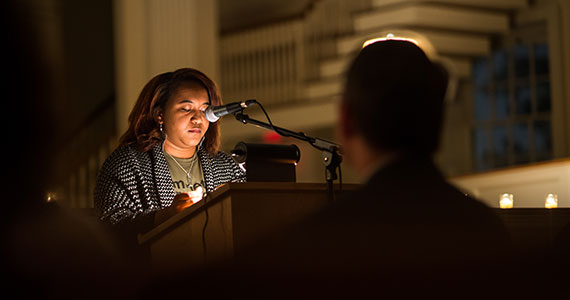
President Jeffrey Herbst speaks at the candlelight service in Memorial Chapel. (Photo by Dylan Crouse ’15)
Last night’s Candlelight Service of Reconciliation in Memorial Chapel was as hopeful as it was poignant, capping off a turbulent semester that many believe will make ş¬Đ߲ݴ«Ă˝ a more inclusive, safe, and respectful community.
The candle-lit event was pitch perfect, from the opening chords of Leonard Cohen’s “Hallelujah,” to the ş¬Đ߲ݴ«Ă˝ Resolutions’ harmonious rendition of Billy Joel’s “And So It Goes.”
Speakers responded from their hearts to a common prompt — “What is our hope for ş¬Đ߲ݴ«Ă˝, and what will we personally do to make that happen?” — and moments of silence allowed time for students, faculty, staff, and administrators to reflect.
While feelings of love and support were palpable, for ş¬Đ߲ݴ«Ă˝ and for all members of the community, events of the past few months were also top of mind.
Since September, there has been a 100-hour sit-in that concluded peacefully with a authored collaboratively by students and administrators. While work progressed on that front, students hosted a focusing on issues of safety and accountability, and staged related to the national police-brutality cases in the news.
Most recently, instances of anonymous threats and hateful speech on social media have spurred vigorous objections across campus and a police investigation.
Among the speakers was Dean of the College who vowed to “regain [her] faith in the inherent good of others,” and, “most importantly, to continue to believe that the only path out of this is love, and forgiveness, and respect.”
Provost and Dean of the Faculty paraphrased Cornel West, comparing hope to optimism, pessimism, and cynicism. “Optimists miss the brutality, the suffering, and injustice. But the pessimists only see the pain and the brokenness. Hope is better,” Hicks said. “It’s to see the world exactly as it is and to imagine better.”
reflected on “love in a time of turbulence,” and why it is wise, not self indulgent, to put on one’s own oxygen mask first: “So you can be there for others who need to breathe, too.”
And Professor called the status quo “a musty, scratchy coat” that she hopes “we never wear again,” and called for more transparency, generosity, and empathy in the future.
In closing, President vowed that he would personally deliver on ş¬Đ߲ݴ«Ă˝â€™s promise to students.
“Our responsibility is not only that you be safe,” he said, “it is that you be strong, and when necessary, you be defiant in the face of challenge.” But anonymous expression, he said, “is a sign of weakness,” and will be drowned out by the stories we tell “person to person, human to human.”
, University Chaplain, Professor , andalso offered reflections. The event was co-sponsored by the Office of the President and the Office of the Chaplains.

